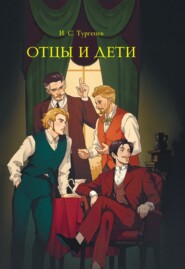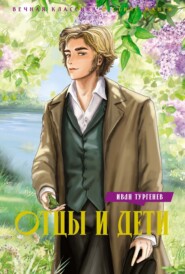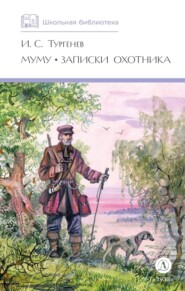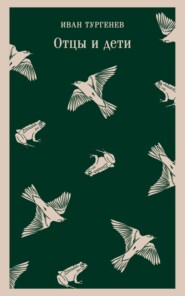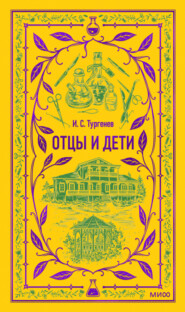По всем вопросам обращайтесь на: info@litportal.ru
(©) 2003-2024.
✖
Annouchka: A Tale
Настройки чтения
Размер шрифта
Высота строк
Поля
Annouchka: A Tale
Turgenev Sergeevich Ivan
Turgenev Ivan Sergeevich
Annouchka: A Tale
I
I was then five-and-twenty, – that was a sufficient indication that I had a past, said he, beginning. My own master for some little time, I resolved to travel, – not to complete my education, as they said at the time, but to see the world. I was young, light-hearted, in good health, free from every care, with a well-filled purse; I gave no thought to the future; I indulged every whim, – in fact, I lived like a flower that expands in the sun. The idea that man is but a plant, and that its flower can only live a short time, had not yet occurred to me. "Youth," says a Russian proverb, "lives upon gilded gingerbread, which it ingenuously takes for bread; then one day even bread fails." But of what use are these digressions?
I travelled from place to place, with no definite plan, stopping where it suited me, moving at once when I felt the need of seeing new faces, – nothing more.
The men alone interested me; I abhorred remarkable monuments, celebrated collections, and ciceroni; the Galerie Verte of Dresden almost drove me mad. As to nature, it gave me some very keen impressions, but I did not care the least in the world for what is commonly called its beauties, – mountains, rocks, waterfalls, which strike me with astonishment; I did not care to have nature impose itself upon my admiration or trouble my mind. In return, I could not live without my fellow-creatures; their talk, their laughter, their movements, were for me objects of prime necessity. I felt superlatively well in the midst of a crowd; I followed gayly the surging of men, shouting when they shouted, and observing them attentively whilst they abandoned themselves to enthusiasm. Yes, the study of men was, indeed, my delight; and yet is study the word? I contemplated them, enjoying it with an intense curiosity.
But again I digress.
So, then, about five-and-twenty years ago I was living in the small town of Z., upon the banks of the Rhine. I sought isolation: a young widow, whose acquaintance I made at a watering-place, had just inflicted upon me a cruel blow. Pretty and intelligent, she coquetted with every one, and with me in particular; then, after some encouragement, she jilted me for a Bavarian lieutenant with rosy cheeks.
This blow, to tell the truth, was not very serious, but I found it advisable to give myself up for a time to regrets and solitude, and I established myself at Z.
It was not alone the situation of this small town, at the foot of two lofty mountains, that had impressed me; it had enticed me by its old walls, flanked with towers, its venerable lindens, the steep bridge, which crossed its limpid river, and chiefly by its good wine.
After sundown (it was then the month of June), charming little German girls, with yellow hair, came down for a walk in its narrow streets, greeting the strangers whom they met with a gracious guten abend. Some of them did not return until the moon had risen from behind the peaked roofs of the old houses, making the little stones with which the streets were paved scintillate by the clearness of its motionless rays. I loved then to wander in the town of Z.; the moon seemed to regard it steadfastly from the depths of a clear sky, and the town felt this look and remained quiet and on the alert, inundated by the clearness that filled the soul with a trouble mingled with sweetness. The cock at the top of the gothic steeple shone with a pale reflection of gold; a similar reflection crept in little golden serpents over the dark depths of the river; at narrow windows, under slated roofs, shone the solitary lights. The German is economical! The vine reared its festoons mysteriously over the walls. At times a rustling could be heard in the obscurity near an old empty well upon the public square of the town; the watchman replied to it by a prolonged whistle, and a faithful dog uttered a deep growl. Then a breath of air came so softly caressing the face, the lindens exhaled a perfume so sweet, that involuntarily the chest dilated more and more, and the name of Marguerite, half in exclamation, half in appeal, arose to the lips.
The town of Z. is about a mile from the Rhine. I often went to admire that magnificent river, and I whiled away entire hours at the foot of a gigantic ash, dwelling, in my reveries, upon many things, among others, but not without a certain effort, upon the image of my faithless widow. A little madonna, with almost infantine features, whose breast showed a red heart, pierced with swords, looked at me in a melancholy way from the midst of the branches. Upon the opposite side of the river, rose up the town of L., a little larger than that in which I was living. I went one evening as usual to take my seat upon my favorite bench; I looked in turn at the water, the heavens, and the vines. Opposite me some tow-headed children clambered over the tarred hull of a boat that had been left upon the sands of the river, bottom up. Little boats, with sails puffed out by the breeze, advanced slowly; greenish waves passed before me, creeping along, swelling out a little, and then going down with a feeble murmur. Suddenly I thought I distinguished the sound of an orchestra, which re-echoed in the distance. I listened; they were playing a waltz in the town of L. The double bass pealed out at intervals, the violin squeaked confusedly, the whistlings of the flute were quite distinct. "What is it?" I asked of an old man who was approaching me. He wore, after the custom of the country, a plush waistcoat, blue stockings, and buckled shoes.
"They are students, who have come from B. for a commersch," he replied, after shifting his pipe to the other side of his mouth.
"Let us see what is a commersch," I said to myself: "besides I have not seen the town of L." I hailed a boatman, and had him take me across the river.
II
Many people, no doubt, are ignorant of what this word commersch means. Thus they designate a fête to which come all the students of the same country or of the same society to take part (Landsmannschaft). Most of the young men who resort to these gatherings wear the traditional costume of the German students, a frogged surtout, large boots, and a small cap, the lace of which is of the color of the country. The students assemble for the banquet, over which presides a Senior, or the oldest of the band, and remain at table until morning. They drink; they sing the Landesvater, the Gaudeamus; they smoke; they laugh at the Philistines, and often indulge in the luxury of an orchestra.
It was a gathering of this kind that was taking place in the garden of the hotel, with the sign of the Soleil. The house and garden, which looked upon the street, were draped with flags; the students were seated at tables under the lindens; an enormous bull-dog was lying under one of the tables; in a corner, under a thicket of ivy, were seated the musicians, who were playing their best, imbibing quantities of beer to keep themselves in working order. A great number of curious townspeople were assembled in the street, before the rather high railing of the garden, the good citizens of the town of L. not wishing to let slip an occasion to examine closely the guests who had come among them. I joined the group of spectators. I could observe with pleasure the faces of the students; their embracings, their exclamations, the innocent presumption of youth, their enthusiastic glances, their impulsive laughter, – the best kind of laughter, that joyful ebullition of a life yet full, that impetuous flight towards no matter what aim, providing it was forward, that abandon full of thoughtlessness, touched and captivated me. Why should I not join them? I asked myself.
"Annouchka, have you not had enough of this?" suddenly said in Russian a man's voice behind me. "Stay a little longer," answered a woman's voice in the same language. I turned quickly, and my looks fell upon a man some young man in a riding-coat and cap; he had on his arm a young girl, very small, whose straw hat almost concealed her features.
"You are a Russian?" I asked of them, with a start which I could not help.
"Yes, we are Russian," answered the young man, smiling.
"I did not expect," I said to him, "in a foreign country to meet" —
"Nor we either," said he, interrupting me. "Allow me," continued he, "to make ourselves known to you; my name is Gaguine, and here is" – he hesitated a moment – "here is my sister. And you, monsieur?"
I in turn told him my name, and we engaged in conversation. I learned that Gaguine was travelling, like myself, for pleasure, and that, having arrived about a week ago at L., he had settled himself there for the time being.
I must confess I do not like to become intimate with Russians in a foreign country. As far as I can see them, I easily recognize their walk, the cut of their clothes, principally the expression of their face. This expression, supercilious and scornful in its nature, at times imperious, suddenly assumes a cautious and even a timid air. They appear seized with a kind of restlessness; their eyes disclose a strange anxiety: "Seigneur! have I not said something foolish; are they laughing at me by chance?" their look seems to ask. Then one sees them again assume their majestic calmness, until a new feeling of uneasiness comes to trouble them. Yes, I say it again, I avoid all intercourse with my fellow-countrymen; nevertheless, at first sight, I felt attracted towards Gaguine. There are in the world such happy faces that one takes pleasure in looking at them, they reflect a warmth which attracts and does one good, as if one had received a caress. Such was Gaguine's, with large eyes as soft as the curls of his hair, and a voice whose sound made you divine that he had a smile upon his lips.
The young girl whom he called his sister at first sight appeared to me charming. There was an expression quite peculiar, piquant and pretty at times, upon her round and slightly brown face; her nose was small and slender, her cheeks chubby as a child's, her eyes black and clear. Though well proportioned, her figure had not yet entirely developed. Withal there was no resemblance to her brother.
"Will you come home with us?" said Gaguine to me. "It seems to me that we have looked long enough at these Germans. Russians by this time would have broken up the glasses and chairs; but these young fellows before us are too reserved. Come, Annouchka, is it not time to return home?"
The young girl assented by a nod of the head.
"We live out of town," added Gaguine, "in a small isolated house upon a hill, surrounded by vines. You shall see whether it is pretty! Come, our landlady has promised to make us some cheese-rennet. Besides the day is on the wane, and you will cross the Rhine more securely by moonlight."
We proceeded. A few moments after we passed through the low gate of the town, which was surrounded by an old stone wall that still preserved some battlements. We advanced into the country; after going along by the side of an old wall a hundred paces, we stopped before a little door; Gaguine opened it and made us ascend a steep path, upon the sides of which were rows of vines.
The sun was just setting; a faint purple hue tinged the vines, the props that sustained them, the parched earth covered with pieces of slate, as well as the white walls of a little house, all the bright windows of which were framed in black bars, and towards which the footpath that we were climbing guided us.
"Here is our stopping-place!" cried Gaguine, when were a little way from the house, "and there's our landlady, too, bringing us some milk. Guten abend, madam," cried he. "We are going to have our frugal repast at once; but first," said he, "look about you and tell me what you think of the view."
The site that he showed me was, indeed, admirable. At our feet the silvery waters of the Rhine, illumined by the purple of the setting sun, flowed between the verdant banks. The town, peacefully placed on the river banks, displayed to our eyes all its houses and all its streets; the hills and fields stretched out about it.
If that which was at our feet was beautiful, more lovely still was the sight above our heads. One was struck by the depth and clearness of the heavens, the transparency and brilliancy of the atmosphere. Clear and light, the undulations of the breeze moved softly about us; that also seemed to take delight in the heights.
"You have chosen an admirable place to live in," I said to Gaguine.
"It is Annouchka who found it out," he replied to me. "Come, Annouchka, give your orders. Have them bring everything here; we will sup in the open air, that we may hear the music better. Have you noticed," added he, turning to me, "that such music as a waltz near at hand seems detestable; heard at a distance, charms and makes all the poetic chords of your heart vibrate."
Annouchka directed her steps towards the house, and soon returned accompanied by the landlady. They brought an enormous dish of milk, spoons, plates, sugar, fruits, and bread. We seated ourselves and began to eat. Annouchka took off her hat; her black hair, cut short, fell in large curls over her ears and her neck. My presence appeared to embarrass her; but Gaguine said to her, "don't be shy; he will not bite you."
These words made her smile, and a few moments after she spoke to me without the least embarrassment. She did not remain quiet a moment. Hardly was she seated than she arose, ran towards the house, and reappeared again, singing in a low voice; often she laughed, and her laugh had something strange about it – one would say that it was not provoked by anything that was said, but by some thoughts that were passing through her mind. Her large eyes looked one in the face openly, with boldness, but at times she half closed her eyelids, and her looks became suddenly deep and caressing.
We chatted for about two hours. It was some time since the sun had gone down, and the evening light, at first resplendent with fire, then calm and red, later on confused and dim, mingled little by little with the shades of night. Yet our conversation still went on. Gaguine had a bottle of Rhine wine brought; we drank it slowly. The music had not stopped, but the sounds that the wind brought us seemed sweeter. In the town and upon the river lights began to spring up. Annouchka suddenly lowered her head, her curly hair fell over her brow, then she became silent and sighed. In a few moments she told us that she was sleepy and went into the house. I followed her with my eyes, and saw her sitting a long time motionless in the shadow behind the closed window. At last the moon appeared on the horizon, and its rays made the waters of the Rhine scintillate softly. Everything before us suddenly changed; brightness, then darkness, sprang up in every direction, and the wine, even in our glasses, assumed a mysterious appearance. There was no longer any wind; it ceased suddenly, like a bird that folds its wings; a delicate and warm perfume arose from the ground.
"It is time to go!" I exclaimed, "otherwise I shall not find a boatman."
"Yes, it is time," replied Gaguine. We took the path that came down the mountain. Suddenly we heard some pebbles rolling behind us; it was Annouchka, who was coming to rejoin us.
"You did not go to bed then?" said her brother.
She did not reply, but ran down before us. Some of the lamps that the students had to light up the garden still threw a dying glimmer, which lighted up the foliage of the trees, at the foot of which they burnt, and gave to them a solemn and fantastic appearance. We found Annouchka upon the bank; she was talking with the boatman. I jumped into the boat and took leave of my new friends. Gaguine promised me a visit the next day. I gave him my hand, which he pressed; I offered the other to Annouchka, but she contented herself by looking at me and nodding her head. The boat was set loose from the bank, and the current carried it along with rapidity. The boatman, a robust old man, plunged his oars energetically into the dark waters of the river.
"You are going into the reflection of the moon," cried Annouchka; "you have broken it."
I looked upon the river, its dim shadows crowded about the boat.
"Adieu," she said once more.
"To-morrow, then," added Gaguine.
The boat reached the shore; I jumped out of it and looked behind me, but I no longer saw any one on the other bank. The reflection of the moon spread out again, like a bridge of gold, from one bank of the river to the other.
The last chords of a waltz of Lanner's could be heard, as if bidding me a farewell. Gaguine was right; these far-away sounds moved me strangely.
I regained the house through the fields, shrouded in a profound obscurity, inhaling slowly the balmy air; and when I had re-entered my little room, I felt troubled to the bottom of my soul by the confused expectation of an undefined happiness. What do I say? I was already happy; why? I could not have told what I wanted, nor of what I was thinking, and yet I was happy.
Turgenev Sergeevich Ivan
Turgenev Ivan Sergeevich
Annouchka: A Tale
I
I was then five-and-twenty, – that was a sufficient indication that I had a past, said he, beginning. My own master for some little time, I resolved to travel, – not to complete my education, as they said at the time, but to see the world. I was young, light-hearted, in good health, free from every care, with a well-filled purse; I gave no thought to the future; I indulged every whim, – in fact, I lived like a flower that expands in the sun. The idea that man is but a plant, and that its flower can only live a short time, had not yet occurred to me. "Youth," says a Russian proverb, "lives upon gilded gingerbread, which it ingenuously takes for bread; then one day even bread fails." But of what use are these digressions?
I travelled from place to place, with no definite plan, stopping where it suited me, moving at once when I felt the need of seeing new faces, – nothing more.
The men alone interested me; I abhorred remarkable monuments, celebrated collections, and ciceroni; the Galerie Verte of Dresden almost drove me mad. As to nature, it gave me some very keen impressions, but I did not care the least in the world for what is commonly called its beauties, – mountains, rocks, waterfalls, which strike me with astonishment; I did not care to have nature impose itself upon my admiration or trouble my mind. In return, I could not live without my fellow-creatures; their talk, their laughter, their movements, were for me objects of prime necessity. I felt superlatively well in the midst of a crowd; I followed gayly the surging of men, shouting when they shouted, and observing them attentively whilst they abandoned themselves to enthusiasm. Yes, the study of men was, indeed, my delight; and yet is study the word? I contemplated them, enjoying it with an intense curiosity.
But again I digress.
So, then, about five-and-twenty years ago I was living in the small town of Z., upon the banks of the Rhine. I sought isolation: a young widow, whose acquaintance I made at a watering-place, had just inflicted upon me a cruel blow. Pretty and intelligent, she coquetted with every one, and with me in particular; then, after some encouragement, she jilted me for a Bavarian lieutenant with rosy cheeks.
This blow, to tell the truth, was not very serious, but I found it advisable to give myself up for a time to regrets and solitude, and I established myself at Z.
It was not alone the situation of this small town, at the foot of two lofty mountains, that had impressed me; it had enticed me by its old walls, flanked with towers, its venerable lindens, the steep bridge, which crossed its limpid river, and chiefly by its good wine.
After sundown (it was then the month of June), charming little German girls, with yellow hair, came down for a walk in its narrow streets, greeting the strangers whom they met with a gracious guten abend. Some of them did not return until the moon had risen from behind the peaked roofs of the old houses, making the little stones with which the streets were paved scintillate by the clearness of its motionless rays. I loved then to wander in the town of Z.; the moon seemed to regard it steadfastly from the depths of a clear sky, and the town felt this look and remained quiet and on the alert, inundated by the clearness that filled the soul with a trouble mingled with sweetness. The cock at the top of the gothic steeple shone with a pale reflection of gold; a similar reflection crept in little golden serpents over the dark depths of the river; at narrow windows, under slated roofs, shone the solitary lights. The German is economical! The vine reared its festoons mysteriously over the walls. At times a rustling could be heard in the obscurity near an old empty well upon the public square of the town; the watchman replied to it by a prolonged whistle, and a faithful dog uttered a deep growl. Then a breath of air came so softly caressing the face, the lindens exhaled a perfume so sweet, that involuntarily the chest dilated more and more, and the name of Marguerite, half in exclamation, half in appeal, arose to the lips.
The town of Z. is about a mile from the Rhine. I often went to admire that magnificent river, and I whiled away entire hours at the foot of a gigantic ash, dwelling, in my reveries, upon many things, among others, but not without a certain effort, upon the image of my faithless widow. A little madonna, with almost infantine features, whose breast showed a red heart, pierced with swords, looked at me in a melancholy way from the midst of the branches. Upon the opposite side of the river, rose up the town of L., a little larger than that in which I was living. I went one evening as usual to take my seat upon my favorite bench; I looked in turn at the water, the heavens, and the vines. Opposite me some tow-headed children clambered over the tarred hull of a boat that had been left upon the sands of the river, bottom up. Little boats, with sails puffed out by the breeze, advanced slowly; greenish waves passed before me, creeping along, swelling out a little, and then going down with a feeble murmur. Suddenly I thought I distinguished the sound of an orchestra, which re-echoed in the distance. I listened; they were playing a waltz in the town of L. The double bass pealed out at intervals, the violin squeaked confusedly, the whistlings of the flute were quite distinct. "What is it?" I asked of an old man who was approaching me. He wore, after the custom of the country, a plush waistcoat, blue stockings, and buckled shoes.
"They are students, who have come from B. for a commersch," he replied, after shifting his pipe to the other side of his mouth.
"Let us see what is a commersch," I said to myself: "besides I have not seen the town of L." I hailed a boatman, and had him take me across the river.
II
Many people, no doubt, are ignorant of what this word commersch means. Thus they designate a fête to which come all the students of the same country or of the same society to take part (Landsmannschaft). Most of the young men who resort to these gatherings wear the traditional costume of the German students, a frogged surtout, large boots, and a small cap, the lace of which is of the color of the country. The students assemble for the banquet, over which presides a Senior, or the oldest of the band, and remain at table until morning. They drink; they sing the Landesvater, the Gaudeamus; they smoke; they laugh at the Philistines, and often indulge in the luxury of an orchestra.
It was a gathering of this kind that was taking place in the garden of the hotel, with the sign of the Soleil. The house and garden, which looked upon the street, were draped with flags; the students were seated at tables under the lindens; an enormous bull-dog was lying under one of the tables; in a corner, under a thicket of ivy, were seated the musicians, who were playing their best, imbibing quantities of beer to keep themselves in working order. A great number of curious townspeople were assembled in the street, before the rather high railing of the garden, the good citizens of the town of L. not wishing to let slip an occasion to examine closely the guests who had come among them. I joined the group of spectators. I could observe with pleasure the faces of the students; their embracings, their exclamations, the innocent presumption of youth, their enthusiastic glances, their impulsive laughter, – the best kind of laughter, that joyful ebullition of a life yet full, that impetuous flight towards no matter what aim, providing it was forward, that abandon full of thoughtlessness, touched and captivated me. Why should I not join them? I asked myself.
"Annouchka, have you not had enough of this?" suddenly said in Russian a man's voice behind me. "Stay a little longer," answered a woman's voice in the same language. I turned quickly, and my looks fell upon a man some young man in a riding-coat and cap; he had on his arm a young girl, very small, whose straw hat almost concealed her features.
"You are a Russian?" I asked of them, with a start which I could not help.
"Yes, we are Russian," answered the young man, smiling.
"I did not expect," I said to him, "in a foreign country to meet" —
"Nor we either," said he, interrupting me. "Allow me," continued he, "to make ourselves known to you; my name is Gaguine, and here is" – he hesitated a moment – "here is my sister. And you, monsieur?"
I in turn told him my name, and we engaged in conversation. I learned that Gaguine was travelling, like myself, for pleasure, and that, having arrived about a week ago at L., he had settled himself there for the time being.
I must confess I do not like to become intimate with Russians in a foreign country. As far as I can see them, I easily recognize their walk, the cut of their clothes, principally the expression of their face. This expression, supercilious and scornful in its nature, at times imperious, suddenly assumes a cautious and even a timid air. They appear seized with a kind of restlessness; their eyes disclose a strange anxiety: "Seigneur! have I not said something foolish; are they laughing at me by chance?" their look seems to ask. Then one sees them again assume their majestic calmness, until a new feeling of uneasiness comes to trouble them. Yes, I say it again, I avoid all intercourse with my fellow-countrymen; nevertheless, at first sight, I felt attracted towards Gaguine. There are in the world such happy faces that one takes pleasure in looking at them, they reflect a warmth which attracts and does one good, as if one had received a caress. Such was Gaguine's, with large eyes as soft as the curls of his hair, and a voice whose sound made you divine that he had a smile upon his lips.
The young girl whom he called his sister at first sight appeared to me charming. There was an expression quite peculiar, piquant and pretty at times, upon her round and slightly brown face; her nose was small and slender, her cheeks chubby as a child's, her eyes black and clear. Though well proportioned, her figure had not yet entirely developed. Withal there was no resemblance to her brother.
"Will you come home with us?" said Gaguine to me. "It seems to me that we have looked long enough at these Germans. Russians by this time would have broken up the glasses and chairs; but these young fellows before us are too reserved. Come, Annouchka, is it not time to return home?"
The young girl assented by a nod of the head.
"We live out of town," added Gaguine, "in a small isolated house upon a hill, surrounded by vines. You shall see whether it is pretty! Come, our landlady has promised to make us some cheese-rennet. Besides the day is on the wane, and you will cross the Rhine more securely by moonlight."
We proceeded. A few moments after we passed through the low gate of the town, which was surrounded by an old stone wall that still preserved some battlements. We advanced into the country; after going along by the side of an old wall a hundred paces, we stopped before a little door; Gaguine opened it and made us ascend a steep path, upon the sides of which were rows of vines.
The sun was just setting; a faint purple hue tinged the vines, the props that sustained them, the parched earth covered with pieces of slate, as well as the white walls of a little house, all the bright windows of which were framed in black bars, and towards which the footpath that we were climbing guided us.
"Here is our stopping-place!" cried Gaguine, when were a little way from the house, "and there's our landlady, too, bringing us some milk. Guten abend, madam," cried he. "We are going to have our frugal repast at once; but first," said he, "look about you and tell me what you think of the view."
The site that he showed me was, indeed, admirable. At our feet the silvery waters of the Rhine, illumined by the purple of the setting sun, flowed between the verdant banks. The town, peacefully placed on the river banks, displayed to our eyes all its houses and all its streets; the hills and fields stretched out about it.
If that which was at our feet was beautiful, more lovely still was the sight above our heads. One was struck by the depth and clearness of the heavens, the transparency and brilliancy of the atmosphere. Clear and light, the undulations of the breeze moved softly about us; that also seemed to take delight in the heights.
"You have chosen an admirable place to live in," I said to Gaguine.
"It is Annouchka who found it out," he replied to me. "Come, Annouchka, give your orders. Have them bring everything here; we will sup in the open air, that we may hear the music better. Have you noticed," added he, turning to me, "that such music as a waltz near at hand seems detestable; heard at a distance, charms and makes all the poetic chords of your heart vibrate."
Annouchka directed her steps towards the house, and soon returned accompanied by the landlady. They brought an enormous dish of milk, spoons, plates, sugar, fruits, and bread. We seated ourselves and began to eat. Annouchka took off her hat; her black hair, cut short, fell in large curls over her ears and her neck. My presence appeared to embarrass her; but Gaguine said to her, "don't be shy; he will not bite you."
These words made her smile, and a few moments after she spoke to me without the least embarrassment. She did not remain quiet a moment. Hardly was she seated than she arose, ran towards the house, and reappeared again, singing in a low voice; often she laughed, and her laugh had something strange about it – one would say that it was not provoked by anything that was said, but by some thoughts that were passing through her mind. Her large eyes looked one in the face openly, with boldness, but at times she half closed her eyelids, and her looks became suddenly deep and caressing.
We chatted for about two hours. It was some time since the sun had gone down, and the evening light, at first resplendent with fire, then calm and red, later on confused and dim, mingled little by little with the shades of night. Yet our conversation still went on. Gaguine had a bottle of Rhine wine brought; we drank it slowly. The music had not stopped, but the sounds that the wind brought us seemed sweeter. In the town and upon the river lights began to spring up. Annouchka suddenly lowered her head, her curly hair fell over her brow, then she became silent and sighed. In a few moments she told us that she was sleepy and went into the house. I followed her with my eyes, and saw her sitting a long time motionless in the shadow behind the closed window. At last the moon appeared on the horizon, and its rays made the waters of the Rhine scintillate softly. Everything before us suddenly changed; brightness, then darkness, sprang up in every direction, and the wine, even in our glasses, assumed a mysterious appearance. There was no longer any wind; it ceased suddenly, like a bird that folds its wings; a delicate and warm perfume arose from the ground.
"It is time to go!" I exclaimed, "otherwise I shall not find a boatman."
"Yes, it is time," replied Gaguine. We took the path that came down the mountain. Suddenly we heard some pebbles rolling behind us; it was Annouchka, who was coming to rejoin us.
"You did not go to bed then?" said her brother.
She did not reply, but ran down before us. Some of the lamps that the students had to light up the garden still threw a dying glimmer, which lighted up the foliage of the trees, at the foot of which they burnt, and gave to them a solemn and fantastic appearance. We found Annouchka upon the bank; she was talking with the boatman. I jumped into the boat and took leave of my new friends. Gaguine promised me a visit the next day. I gave him my hand, which he pressed; I offered the other to Annouchka, but she contented herself by looking at me and nodding her head. The boat was set loose from the bank, and the current carried it along with rapidity. The boatman, a robust old man, plunged his oars energetically into the dark waters of the river.
"You are going into the reflection of the moon," cried Annouchka; "you have broken it."
I looked upon the river, its dim shadows crowded about the boat.
"Adieu," she said once more.
"To-morrow, then," added Gaguine.
The boat reached the shore; I jumped out of it and looked behind me, but I no longer saw any one on the other bank. The reflection of the moon spread out again, like a bridge of gold, from one bank of the river to the other.
The last chords of a waltz of Lanner's could be heard, as if bidding me a farewell. Gaguine was right; these far-away sounds moved me strangely.
I regained the house through the fields, shrouded in a profound obscurity, inhaling slowly the balmy air; and when I had re-entered my little room, I felt troubled to the bottom of my soul by the confused expectation of an undefined happiness. What do I say? I was already happy; why? I could not have told what I wanted, nor of what I was thinking, and yet I was happy.






